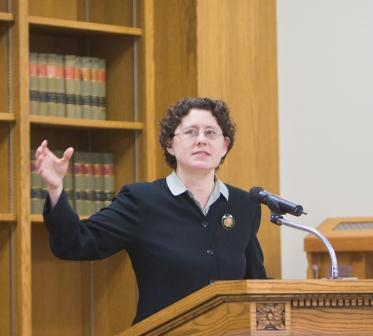Professor Clark Presents Discussion Series Lecture, 1 December 2011

Professor Elizabeth A. Clark, Associate Director of the International Center for Law and Religion Studies and the Center’s regional advisor for Central and Eastern Europe, presented the final lecture in the first International Religious Freedom Discussion Series on Thursday, 1 December 2011 in Room 472 of the J. Reuben Clark Law School at Brigham Young University.
- Download the mp4 video of the presentation here.
- Download the PowerPoint Presentation here.
Professor Clark’s lec ture, “Recent Legislative Trends Affecting Religious Freedom in Eastern Europe and Central Asia,” addressed continuing and even increasing restrictions on religious freedom, including increased registration requirements, requirement of “religious expertise” by state bodies, and limitations on proselytizing, distribution of religious materials, and foreign-led organizations. Professor Clark discussed recent legislation in Kazakhstan, Kyrgyzstan, and Armenia, as well as legislative proposals from Russia and Ukraine. She began with a comment from a high-level Russian official responding to recent attempts to draft amendments to the Russian religion law: “Whenever we try to improve things, we manage to make them worse.”
In many ways the religious landscape in countries formerly controlled by the Soviet Union is indeed worsening. Laws draft and passed between 2009 and October 2011 in Turkmenistan, Kyrgystan, Tajikistan, Ukraine, Armenia, Georgia, Russia, and perhaps most alarmingly Kazakhstan have been increasingly restrictive on religions, especially small or new religious organizations. New requirements make it difficult if not impossible for new groups to find legitimacy and safety in many of these areas, and in other former Soviet countries such as Hungary.
Professor Clark traced many of these troubling developments as they are influenced by fear of extremism and attempts of governments and traditional religions to consolidate power. Such forces are to a small extent counterbalanced by religious diversity (in Ukraine, for example), and by pressures for change from the Council of Europe, the Organization for Security and Cooperation in Europe (OSCE), and by judgments of the European Court of Human Rights.
As Associate Director since the beginning of ICLRS in 2000, and before that as an associate of Cole Durham in his international religious freedom work, Elizabeth Clark has co-organized and taken part in dozens of conferences and academic projects with other scholars and with government leaders from around the world. She has from the beginning played a major role in organizing the Annual International Law and Religion Symposium at Brigham Young University.
Drawing on her multilingual talents in Russian, Czech, German and French, Professor Clark has been active in writing and lecturing on church-state and comparative law topics. She has taught classes on Comparative Law, Comparative Constitutional Law, International Human Rights, and European Union law at the J. Reuben Clark Law School at Brigham Young University. She has published numerous articles and chapters on church-state issues and has been an associate editor of three major books: Facilitating Freedom of Religion and Belief and two books on law and religion in post-Communist Europe. Professor Clark has also testified before Congress on religious freedom issues, has taken part in drafting commentaries and legal analyses of pending legislation and developments affecting religious freedom, and in 2011 took the principal role in drafting an amicus brief on international religious freedom issues for the U.S. Supreme Court.
Elizabeth Clark graduated summa cum laude from the BYU Law School, where she was Editor-in-Chief of the BYU Law Review. Before joining the Center, she was an associate in the Washington, D.C., office of Mayer, Brown & Platt, where she was a member of the Appellate and Supreme Court Litigation Group. She also clerked for Judge J. Clifford Wallace on the U.S. Court of Appeals for the Ninth Circuit.